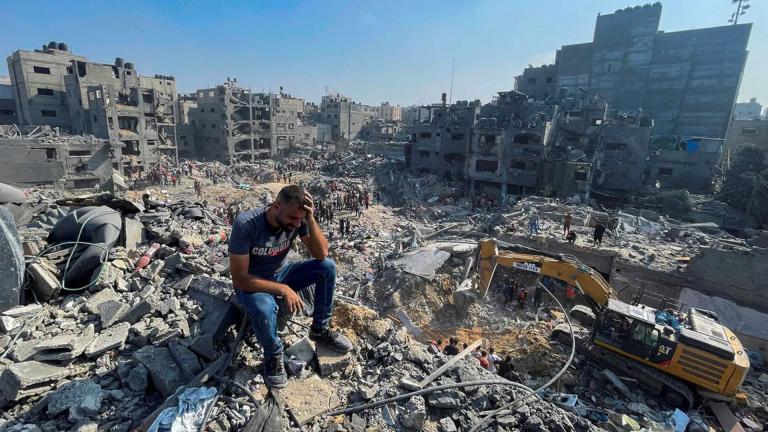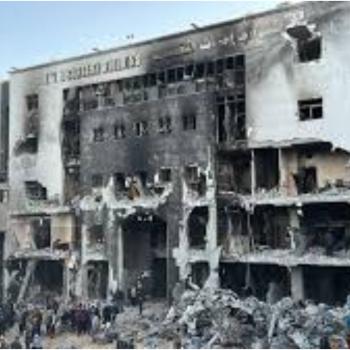
Several years ago, I was in the home of Roni Keidar. Roni is an Israeli who lives less than one mile from the border of Gaza. As we indulged in Roni’s hospitality, we sat in her living room and listened.
NB: See this YouTube video made by Roni a few weeks ago.
Roni spoke of her experiences living so close to Gaza. She noted that rockets fired from Gaza had landed in her front yard. She told us that on one occasion some of the tunnels from Gaza opened in her front yard. Her grown children regularly encourage her to move. Roni refuses.
This was not the incredible part of Roni’s story, however. The incredible part of her story was that she advocates for the people in Gaza. Roni, in fact, wrote a piece in May of 2023 in Haaretz, “I live next to Gaza and I do not support air strikes on our neighbors.”
When we asked why she supports the people of Gaza, even though she frequently scurries to her bomb shelter, she explained, “If you knew how bad things were in Gaza, you would understand why they throw missiles over the wall.”
When is it enough?
As the death toll in Gaza nears 30,000, the world must ask: “How much is enough?” For Netanyahu and many Israelis, the answer appears to be only when Hamas is totally defeated. For, the thinking goes, only then will Israel be safe.
The problem, as I have argued repeatedly on the determinetruth livestream series, Hamas cannot be defeated. Sure, they might be able to eradicate the present version of Hamas, but not without extreme civilian casualties. In addition, even if one were to root out all of the Hamas operatives in Gaza, the fact that a number of Hamas officials are in Qatar means that Hamas will live on.
An even greater problem, however, is that Hamas is an ideology. As a result, Israel’s efforts to eliminate Hamas are, in fact, only serving to recruit more radicals. Since Israel’s offensive on Gaza after the attack of Oct 7, there are reportedly 17,000 Gazan children who either have no surviving family or have been separated from their families.
NB: You may have heard of the new acronym “WCNSF” (wounded child no surviving family).
The question becomes, “How many of these children has Israel’s bombardment of Gaza radicalized?” This war is not making Israel safer from Hamas. It is making more Hamas radicals.
Furthermore, the world is watching as Israel levels Gaza. They see that 70% of the almost 30,000 deaths are women and children. The world is taking note of the 1.9 million Gazans who have become internally displaced. They are watching Israel bomb hospitals, level homes, bakeries, and every institution of higher learning. When this military operation ends, there will be no homes for those displaced to return to. There will be no Gaza. The world is taking note of the fact that Israel’s attack on Gaza appears to be more of an effort to eliminate Gaza than an effort to eliminate Hamas. Under the pretense of “self-defense” and the need to eliminate Hamas, Israel is committing genocide—whether we agree on the use of “genocide” or not is beside the point here. My point is that the world thinks it is genocide. And they will respond. It is only a matter of time.
This war is not making Israelis safe. It is exposing them to destruction.
Palestinians and Israelis can live in peace
I have been to the Land many times. I have eaten and slept in homes across the West Bank and Israel—Muslim, Christian, and Jewish. My wife and I have hosted Israelis and Palestinians in our home.
Our experiences have taught us that the Israelis and Palestinians are good people. They want to raise children with a hope for the future. They want to live in peace. And they can live in peace (although this looks less and less the case the longer this conflict lasts).
The war in Gaza: what should the church be doing?
Since the events of Oct 7, I have been trying to urge Christians that as members of the Kingdom of God, we must be advocates for peace and justice; we must recognize the human dignity of all persons; we must cry out for the oppressed; we must be champions of hope; we must demand a ceasefire.
NB: follow this link to see all the posts I have written since Oct 7 related to this conflict
Follow this link to view any of the 15 livestreams that we hosted relating to this conflict.
Unfortunately, many Christians, being overly influenced by certain theological convictions and the rhetoric of leading voices in the church as well as by much of the Western propaganda, have become convinced that Israel faces an existential threat that leaves them with no option but to decimate Gaza.
What should the Church be doing?
As Christians, however, we must look at the world through the lens of Jesus and His proclamation of the Kingdom. One of the problems here is that too much of the information undermines the gospel of Jesus.
“I feel bad for the Palestinians, but they should have never elected Hamas; they are terrorists, and this is what happens to terrorists; Israel must be allowed to defend itself; and Israel cannot be at peace as long as they are neighbors.”
What is worse is when the rhetoric comes from the Church: When our pulpits are filled with hate and justifications for war; when our trusted sources capitulate to warmongering; when Christian voices are encouraging a war that has brought about the displacement of upwards of 2 million people, the destruction of cities, and has left 600,000 without food and medicine, and 30,000 dead—70% of whom are women and children—we have undermined the gospel of the kingdom.
It is time for prophetic voices to rise, “Stop! No more of this!” (Luke 22:51). This was Jesus’ response to the disciples’ use of violence during His arrest.
My thoughts on The Bulletin Podcast: “The Promised Land”
After listening to the first two episodes of Christianity Today’s (CT) series on “The Promised Land” titled, “It’s Complicated,” I was grieved. The series is part of The Bulletin podcast and produced by CT’s Mike Cosper—whom I have come to respect for some of his earlier work.
The problem is not simply a matter of disagreeing with Cosper and his views about the Jewish people and the land—in fact, I am not sure of what his convictions are, although I suspect I have a fair idea of what they may be. My concern is that I believe that part of his presentation is dangerous.
Cosper spends much of the first episode with various members of one of the kibbutzim (Kfar Aza) near the Gaza border that was attacked on Oct 7.
In the interviews, we learn that before Oct 7, members of Kfar Aza were sympathetic to the Palestinians. Cosper notes Kfar Aza “was one of the communities most devoted to the welfare and flourishing of the Palestinians.” Of course, this is good to hear.
The problem is that Cosper’s depiction of those who survived that day appears intended to elicit sympathy not merely for their suffering but for their present views relating to Gaza.
Now, we should have no problem sympathizing with them when it comes to the tremendous suffering they experienced on Oct 7—this is Christian. We cannot, however, endorse their desire to see Gaza razed.
Cosper seemingly does just that. In the episode, we listen to one of the members of the kibbutz state explicitly, “I hope they don’t call for a ceasefire.” Another individual told Cosper that he hoped that someday he could return to the kibbutz with a clear view of the beach. Meaning he hoped that Gaza, which presently obstructs his view of the beach, would be leveled.
If Cosper merely intends for us to note the profound transformation that has taken place within the members of the kibbutz, who had been so traumatized by the events of Oct 7, that would be fine. Unfortunately, he doesn’t present their sentiments as a tragic effect of the attack of Oct 7. He doesn’t suggest that it is a shame that one of the groups who previously desired to live in peace with their neighbors has now become filled with hate to the point that they want to see their neighbors annihilated.
Cosper instead comes across as sympathetic to their present position. This seems to be one of the primary points of the episode: namely, Palestinians and their activists are bent on murder, and now they have committed atrocities against a peace-loving community like the one in Kfar Aza that even they no longer desire peace but the destruction of Gaza. The listener, in other words, is meant to understand the Israeli desire to destroy Gaza utterly.
Ironically, whenever anyone attempts to provide the same context for Hamas’ attack on Oct 7, they are immediately silenced with, “There is no justification for Oct 7.” And I agree. But does not the traffic on this street flow in both directions?
If the attacks against Israel on Oct 7 were heinous enough to justify the conviction that Gaza must be decimated, does it not stand to reason that the past 75 years of Israeli oppression, including the deadly blockade of Gaza since 2007, against the people of Gaza, justify Hamas’ heinous response?
The answer for the church is “No.” To both! To the attacks of Hamas and Israel’s response.
In other words, although we might try to understand why members of the kibbutz, who previously wanted to live in peace with the Palestinians but now want to see Gaza leveled to the ground and the place ethnically cleansed, we cannot endorse such sentiments. We must, while grieving with them over their profound loss, help them to see that a violent response will only create more suffering.
The only way forward is for Christians to cry out to both sides, “Stop, no more of this” (Luke 22:51).
Our goal is to keep these posts free of charge. I do not intend to ever hide them behind a paywall. I can only do this if those of you who have been blessed by them and can afford to give ($5, $10, $25, or more/month) do so. You can give a tax-deductible contribution by following this link.
Please share this post and let others know about determinetruth.
If you wish to view this blog on your smartphone through the Determinetruth app simply download the “tithe.ly church” app on your smartphone and insert “determinetruth” as the church name you wish to follow. Once it is loaded, simply click on the “blog” icon and it will automatically load.
If you would like to have Rob speak at your church or organization in person or via Zoom, please let us know by filling out the contact info on the Contact me tab on this site.

















